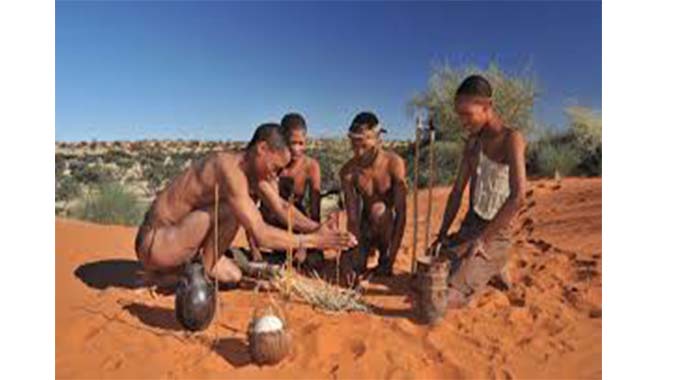Indigenous knowledge systems can provide solutions to environmental problems

Fortunes Matutu
Indigenous knowledge systems (IKS) play a critical role in natural resources management in our country especially in the communal areas. It encompasses local technologies, innovations, know-how, skills, practices and beliefs uniting local people to conserve natural resources and their cultural values.
It’s important to recognise, respect and understand people’s beliefs and traditions in regards to natural resources management in order to preserve the environment. These are unique and differ among communities because communities have different needs and interact with the environment differently. Generation to generation, people have learnt the importance of conserving the environment as it is the primary source of livelihoods.
Solutions to problems associated with natural resources management lie at local level with the IKS of that community. These are still relevant to the current environmental and climatic change as traditional methods of adaptability to such changes have at times proven to work better than “scientific” methods.
Our tradition had strict eco-friendly laws governing the despoliation of sacred sites, forests, water bodies, wetlands and caves. It is these cultural values that kept our forests and environment lavish, abundant and highly productive across the ecosystem.
Rural population in Zimbabwe is reported to be at 68 percent and communal forests cover 40 percent of the countries woodland cover. Thus, the best approach to sustainable natural resources management needs to be community-based and participatory. Through participatory community-based natural resources management, people can use their IKS to come up with effective bylaws to manage their environment.
This is also supported by the provision of the Communal Lands Forest Produce Act, Traditional Leaders Act and Communal Lands Act.
Sacred forests and shrines are protected places which the community reserves for ritual, religious ceremonies such as rain making and burial sites of high-level people in the community. These protected areas tend to have multiple environmental management significance such as biodiversity, forest, wetlands conservation and land use control.
Such places also provide a reserve for a variety of flora and fauna. The forest was protected by strong traditional rules and prohibitions. People were prohibited to cut, hunt, settle, plough or exploit the forest without special grant from the spirit mediums or community leadership.
Seeing the pristine nature of sacred sites, colonial settlers turned most of them into national parks, state forests and world heritage sites such as Matobo World Heritage Site, Mafungautsi Forest, Mana Pools National Park, Zambezi National Park etc.
Taboos save as codes of conduct that help in preserving the natural environment. These involve social restrictions and prohibitions in a particular environment or resource. For example, some places have sacred trees which are prohibited from being cut down, used as firewood or for contrition. In many cases, these trees have other important uses such as medical or nutritional uses e.g umkhuna, umvagazi, ichitamuzi etc.
IKS also teach us of a wide range of sustainable harvesting practices and utilisation of natural resources. These include beliefs and myths on how natural resources should be handled to ensure sustainability.
For example, according to the Ndebele and Kalanga traditional beliefs, the first harvest of mopane worms for each season is supposed to be taken to Njelele and Manyangwa respectively where they are presented to the ancestors during a sacrificial ceremony. The community then gets the blessing of the ancestors and becomes at liberty to harvest the rest of the mopane worms.
The people also believe that there is a stipulated procedure that has to be followed when processing mopane worms. After degutting the worms, they are supposed to be boiled in an open container and dried over ambers. They believe that any other method such as closing the container or placing them directly on mopane worms can affect availability of mopane worms in the next season.
Generally, community elders and spirit mediums view natural resources as gifts from the ancestors and therefore should not be commercialised. Now that mopane worms have been commercialised, many people believe this has affected their availability. In the event that mopane worms become “extinct” in a local area, some people believe that mopane worms can be reintroduced into areas where they had been over-harvested by scattering ashes from the fires used to prepare worms.
While IKS have an invaluable base for developing community-based approaches to natural resources management, they have some limitations which need to be addressed in order to sustainably manage the environment.
One limitation of IKS is that indigenous technology and practice are not universally applicable but are locally grounded.
The local people may not have the intellectual resources to engage with global issues created by capitalism, climate change and globalisation. Their attempt to deal with new problems can only depend on the local pool of techniques which may not be sufficient. This is an opportunity for development partners and environmental cadres to work with the community in finding sustainable ways to continue managing natural resources.
In today’s world, land is becoming scarcer, population density is increasing and there is mixing of different cultures in one settlement making it difficult to practice indigenous knowledge systems.
Ethnic groups and tribes regard some indigenous knowledge systems of other groups as demonic, ancient, retrogressive and uncivilised among the “modernised” community members. Some individuals challenge the suitability of illiterate spirit mediums, traditional leadership in presiding over forest resource management.
These people demand scientific explanation, proof and reliability of indigenous knowledge systems, and are going against the norms, customs, taboos and myths which underpin indigenous knowledge systems in natural resource management.
In conclusion, it can be noted that to a greater extent, indigenous knowledge systems are important and relevant to the current problem of environmental and climate changes.
This is because communities that are still practising traditional/ indigenous knowledge are coping well to the changing environment. Indigenous communities are able to detect the start of the rainy season through indigenous knowledge systems which helps them to plant crops on time.
Moving forward, indigenous knowledge systems and ethnobotany need to be well documented and supported with scientific evidence in order to strengthen and validate community practices. Indigenous knowledge system custodians should be willing to share their knowledge on natural resource conservation because in some cases, they do not release all the information.
These can then accompany the use of scientific methods and statutory laws to maximise adaptation to the changing environment.
Environmental institutions have an opportunity to help the younger community members to appreciate their cultural heritage and find value in the practices of their forefathers.
*Fortunes Matutu is a forester with the Forestry Commission and has a special interest in social forestry.












Comments